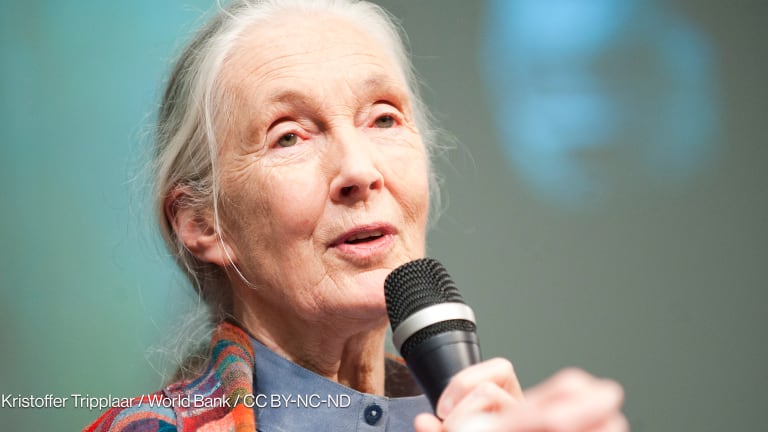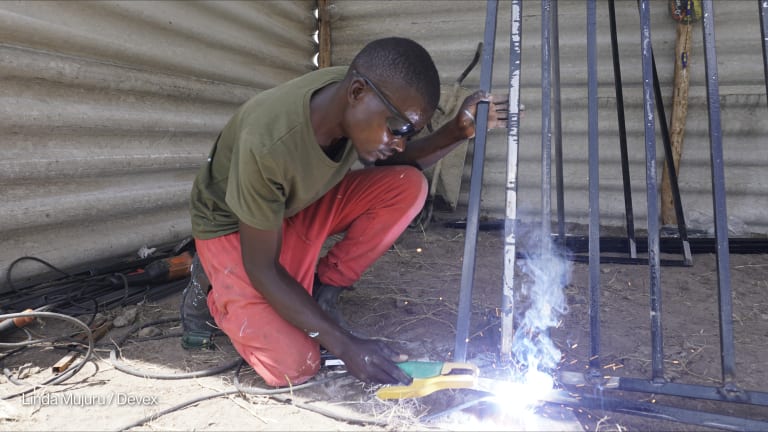In Libya, a young woman helms crusade for a gender-balanced future

International observers have widely credited young people for their role in the Arab Spring. For one young woman in Libya, the 2011 revolution sparked hope women’s rights would change in her country.
In the aftermath of the protests, Alaa Murabit, now 25, founded Voice of Libyan Women, which advocates for improving the political participation and economic empowerment of women in Libya. VLW, the organizer of first-ever international women’s conference in Libya, holds women’s rights seminars in schools, mosques, workplaces and universities and is now looking to organize nationwide university debates on the topic.
“Students told us they want to talk about women’s rights, but they needed a platform where nobody could attack them,” Murabit said. “Debates are a good idea because that way they can say this is the side they have to argue, whether or not they believe in it.”
Devex caught up with Murabit ahead of the launch of its Youth Will campaign to discover how young Libyans are contributing to building a more peaceful and gender-balanced future in the country.
What role are young people currently playing in Libya?
I’m 25 and in this sphere I tend to be the youngest person at the table by a long shot. It’s interesting the way we talk about youth in international policymaking. We say, “Youth are very important and relevant,” and people just leave it there. They don’t talk about how we’re going to amplify young people’s voices.
See more stories from #YouthWill Build Peace:
● 3 key ingredients for building a peaceful generation
● Young people leading tomorrow’s change today
● We must empower and support girls in crisis
● 'Because I was angry'
● 4 lessons on youth and peace building in Lebanon
● 6 ways to successfully engage youths in peace building
● My Bangsamoro story: How the youth can take part in building peace
● A Heartbeat away: How to engage youth through music
● Peace builders, not troublemakers
● UN Security Council, please engage youth in peace building
● On the art of survival — and survivors
We need to recognize that most societies’ policies are driven by the older generation. But conflict is driven by youth, so the solutions to conflict will generally be driven by youth. I don’t mean youth are the masterminds of it in any way, but rather they are utilized almost as tools by regional government, local factions or whoever it is to be agents of conflict.
How were you able to speak out as a young Libyan woman?
More than anything, because of my family. I grew up being told my opinion mattered. Environment and community play a very significant role. You can find topics in every country that women won’t talk about because the conversation is dominated by men and the environment isn’t safe. Peace building and conflict resolution are things predominantly spoken about by men.
The solution to peace building is often how do we better regulate our military, how do we increase our surveillance. It’s how are we better at war? Very few women are in those conversations because the space hasn’t been created. We need to start having that space created by women for women.
How should development organizations work in countries like Libya to help young women have a voice?
I’ve had a very nuanced but more negative experience with international organizations. When they came to Libya they did not understand the local culture, they did not try to identify partners. I have seen them question the legitimacy of female peacemakers and activists, but not question the legitimacy of men with guns. With the women they’d be like: Who is she? Where is she from? Where did she learn her English? What’s her educational degree? But when a guy with a gun arrived, they’d think he was legitimate and somebody to sit down and talk to. That boggles my mind.
Development organizations need to identify local partners and create a platform to amplify their voices. But they shouldn’t try to identify all the partners — that’s never going to work. As an organization, if you can identify three or four bodies whose work is influential, and on which you can have an impact, create partnerships with them because that will grow and mushroom out to other people in a much more sustainable and natural way than trying to identify a million people and never get anything done.
There needs to be more coalitions among development organizations, fueled by more incentive for partner work and collaboration, particularly with local organizations.
We also need to stop having situations where different departments of a development organization ask people the same questions. There’s a genuine fatigue that comes from the local counterparts — they tell me they have repeated themselves 10 times and nothing is happening.
“I have seen them question the legitimacy of female peacemakers and activists, but not question the legitimacy of men with guns ... when a guy with a gun arrived, they’d think he was legitimate and somebody to sit down and talk to. That boggles my mind.”
— Alaa Murabit, founder Voice of Libyan WomenWhat can other development organizations learn from your focus on religion in your campaigns?
We focus heavily on religion, and it’s the reason we’ve been able to get into schools. Unfortunately in the international and Western community, there’s a belief if you want to talk about human rights you can’t talk about faith. There’s a sentiment that you have to minimize faith and that faithful people are ignorant or backward.
Our approach is the exact opposite. We’ve been saying, “Let’s talk about faith,” but the way we understand it to be. I was raised by two extremely religious parents, but my older sister is a pediatric plastic surgeon and I’m able to do the work I do, and they’re extremely supportive and proud of it. That’s the faith I know in my heart that our Prophet [Muhammad] stated.
What challenges have you faced with your work?
It’s been very difficult for us to find partners who understand the way we look at things. The way we see the issue of tackling women’s rights, it needs to be done as you’d bake a cake — you can’t cook it only from the bottom or the top.
Partners often want to tackle one obstacle or challenge first. We say, “You have to be more holistic.” You can’t start talking about economic empowerment if you don’t talk about social empowerment. You can’t start talking about education, if you don’t talk to the government about facilities. If a school is dilapidated, you won’t send your daughter there. Families will feel it’s safer to keep their daughters at home than in a school where a man could come in with a gun at any second.
If you look at it altogether, identify the key pieces, and find partners to work on each one, this is the only way it can be done. We can’t do it all.
Want to learn more? Check out the Youth Will website and tweet #YouthWill.
Youth Will is an online conversation hosted by Devex in partnership with Chemonics, The Commonwealth Secretariat, The MasterCard Foundation and UN-Habitat to explore the power that youth around the globe hold to change their own futures and those of their peers.
Search for articles
Most Read
- 1
- 2
- 3
- 4
- 5








